#langblr post
Text
kde - kam - odkud?
prepositions of place (where? - to where? - from where?)
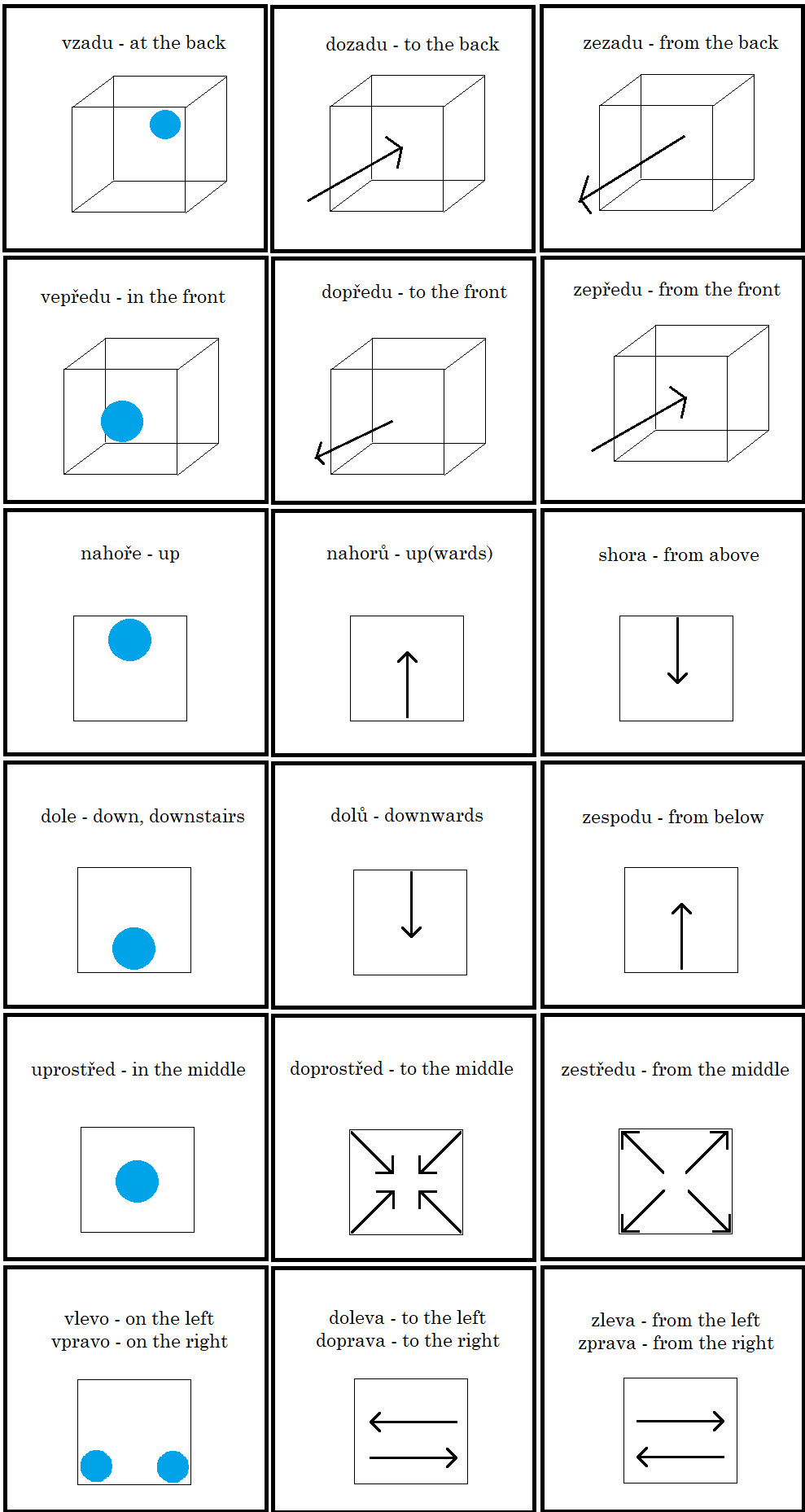
#czech#czech language#learn czech#learning czech#languages#language learning#langblr#langblr post#czech langblr#czech blog#made by yours truly#on paint#thanks paint
74 notes
·
View notes
Text
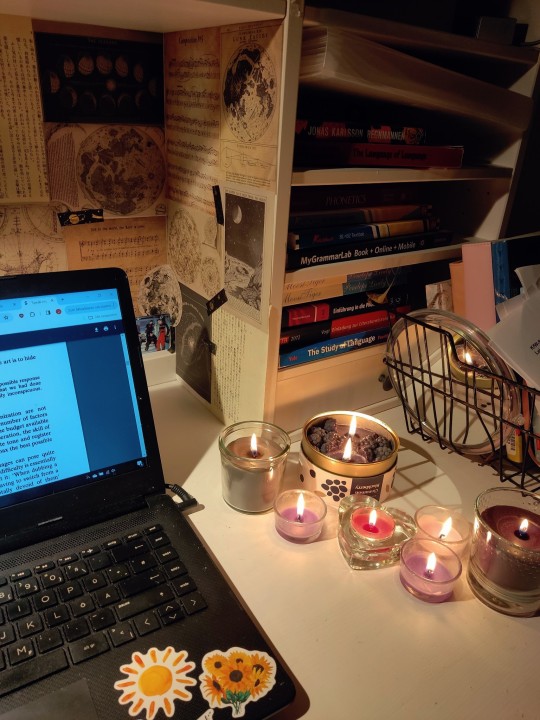

19.01.24 ☄️ crazy to think that the next time i won't be stressed is in *checks calendar* three months......
🎧 - voulez vous by abba
#i feel like the only thing i'm posting is the view from my window😭😭#studyblr#langblr#aesthetic#study aesthetic#study inspiration#studying english literature#studying linguistics#studyspo#academia#jaystudies
1K notes
·
View notes
Text
Teaching French to English Speakers:
French lesson: The word "sur" means "on"
English speaker: Okay.
French lesson: For example,
The vase is [on] the table.
The house is [on] the right.
I read this book [on] his recommendation.
Bring me the file [on] copyright licensing.
English speaker: Right. Got it. "Sur" means "on."
.
Teaching French to Chinese speakers:
French lesson: The word "sur" means "on."
Chinese speaker: Okay.
French lesson: For example,
The vase is [on] the table
Chinese speaker: Right. Got it. "Sur" means "on."
French lesson: The word "sur" also means "towards."
Chinese speaker: Eh?
French lesson: For example,
The house is [towards] the right.
Chinese speaker: Oh...kay.
French lesson: The word "sur" also means "because of."
Chinese speaker: What? H..how? What?
French lesson: For example,
I read this book [because of] his recommendation.
Chinese speaker: Why does this one word mean all these things? Don't y'all have any other words?
French lesson: The word "sur" also means "containing information pertaining to."
Chinese speaker: Stop fucking around with me.
French lesson: For example,
Bring me the file [containing information pertaining to] copyright licensing.
Chinese speaker: What the fuck is wrong with this language?
#linguistics#english#french langblr#chinese langblr#french grammar#since ppl who don't follow me are reblogging this I feel I should clarify that I made this post#because I've been taking 2 French courses on Duolingo - the one for English speakers AND the one for Chinese speakers#I finished the Duolingo Chinese course for English speakers and was frustrated by how little content it offered
18K notes
·
View notes
Text
When someone speaks a foreign language in public and I’m desperately trying not to stare like I’m sorry I’m not racist I just desperately want to hear the different vowel sounds you’re making. sorry.
#also every time I hear a language in public I wanna figure out what it is#and don’t even get me started on if it’s one I recognize#if it’s Japanese I’m like#if they say one of the few words I can understand I go insane#even if they just use particles. and I hear/recognize them. it’s so exciting for me#<-(I’m a nerd and this is what qualifies as fun for me)#but also it’s rude to stare and eavesdrop too much I’m sure#and I don’t want people to feel uncomfortable#Quinn posts#language#langblr#linguistics#language learning#languages#100#500
829 notes
·
View notes
Text
Baldur's Gate 3 - Non-binary Translation in Spanish
A while back I had mentioned that when I learned how to change language settings for Baldur's Gate 3, I was curious to learn how they would adapt the non-binary [no binario] option into Spanish since Spanish (like many Romance Languages) is very gendered
What I saw actually surprised me a bit
Usually in game translations with different genders, English tends to treat you as a "they" even though it's usually male or female; and in Spanish most of the lines are gendered, or phrased in a very ambiguous way in translation like speaking of your character as una persona "a person" rather than "he" or "she", or "they"
This is one of the first times I've seen the gender neutral -e endings used in an official setting
-
For the purposes of this, and any future posts on this, I decided I would try to play as a non-binary gnome cleric. I should also mention that when you start up the game in Spanish and you do the character customization, everything starts you with the base word (i.e. masculine by default, or possibly agender but looks masculine)... as in you can choose to be elfo "elf", semielfo "half-elf", humano "human", semiorco "half-orc"... choose between bárbaro "barbarian", mago "wizard", brujo "warlock" and so on
My default character creation screen read gnomo, clérigo for "gnome cleric"
But the way your character is addressed by others is what changes
The first NPC you interact with is "Us" a little brain thing you can choose to help. If you do it calls you "friend":
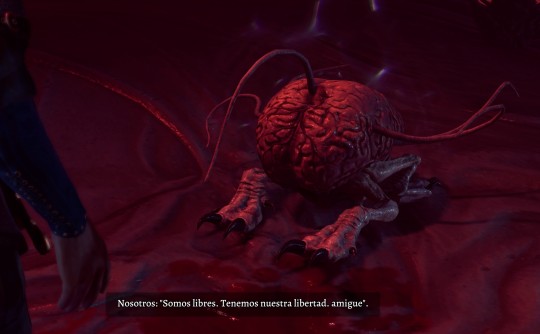
Nosotros: Somos libres. Tenemos nuestra libertad. amigue
Us: We are free. We have our freedom. Friend [nb].
The word used is amigue
For the sake of understanding Spanish grammar, you probably know amigo/a "friend". The G here is a hard G. The gender neutral ending is E... but the combination of GE is pronounced like an H sound in Spanish [la gelatina "gelatin" for example is like "hel-a-ti-na"]. To preserve that hard G sound, you have to add a UE to it... so amigo/a becomes amigue for non-binary
[if you study Spanish this is the exact same grammar you'll see in turning -gar verbs into subjunctive forms; why pagar would turn to pague]
The next person you come across is Lae'zel:
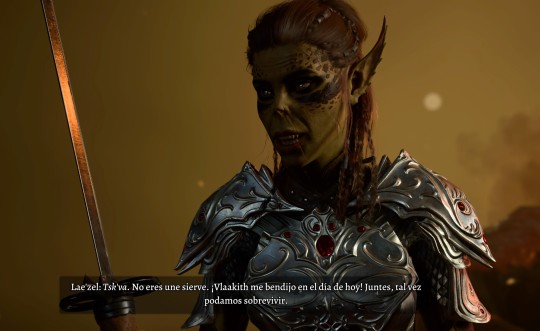
Lae'zel: Tsk'va. No eres une sierve. ¡Vlaakith me bendijo en el día de hoy! Juntes, tal vez podamos sobrevivir.
Lae'zel: Tsk'va. You are no thrall [nb]. Vlaakith blessed me today ["on this day of today"; emphatic]. Together [nb plural], we may (yet) survive.
Interestingly, there's first siervo/a meaning "servant" or "serf" or "thrall"
What I found very interesting was that you have une... un and una being "a" are used for indefinite articles; the non-binary form seems to be une
What threw me off though was seeing juntes... now junto/a is "together" [lit. "joined"] but juntes implies a non-binary plural.
I don't know if this is because in Spanish grammar it would imply that non-binary trumps feminine [the way amigos "friends" could be male+female or multiple male, as opposed to amigas "friends" being all female]... or if it's maybe an error or something else; the game treats Lae'zel as a woman in every other regard so I think it's the first one which is a situation I somehow hadn't considered. I had just assumed it would be juntos ...or juntas if you played female
Next I decided to rescue Gale first because he uses a lot of adjectives/professions and I wanted to see what they looked like:

Gale: No serás clérigue por casualidad, ¿verdad? ¿Médique? ¿Cirujane? ¿Increíblemente hábil con una aguja de tejer?
Gale: You wouldn't happen to be a cleric, right? A doctor/medic? Surgeon? Unbelievably skilled with a knitting needle?
First is clérigo/a "cleric" being used in non-binary as clérigue. Similarly we have médique which is the non-binary médico/a for "medical doctor"
[just like above C turned to QUE to preserve a hard C/K sound; you'll see this with subjunctive and even preterites of -car verbs... why atacar "to attack" will turn to ataqué "I attacked" and ataque in subjunctive... because CE has a soft S sound in Latin America, and can be lisped in Spain]
And next is cirujane... the word cirujano/a is "surgeon"
Finally important note - hábil being "able" or "skilled" is a unisex adjective, so there is no change in any gender - masculine, feminine, or non-binary
*Note: I did miss it but at some point someone used the article le to describe my character. The el and la "the" are the masculine and feminine definite articles; le is non-binary "the" which still catches me by surprise because it looks French to me
-
I've been told since I made the original post that people have seen the non-binary E ending used in other things, but this was special for me to see. I'm curious how the other gendered languages available treated non-binary options
It was a fun surprise for me, especially for some modern day Spanish linguistics in a VERY big modern game, with non-binary word choices being heavily prominent. It's a bit of a learning experience for me
If I find any more fun examples of NB language being used I'll let y'all know as I go
#bg3#baldur's gate 3#spanish#language#langblr#translation#long post#non binary#linguistica#fun with translation
721 notes
·
View notes
Text
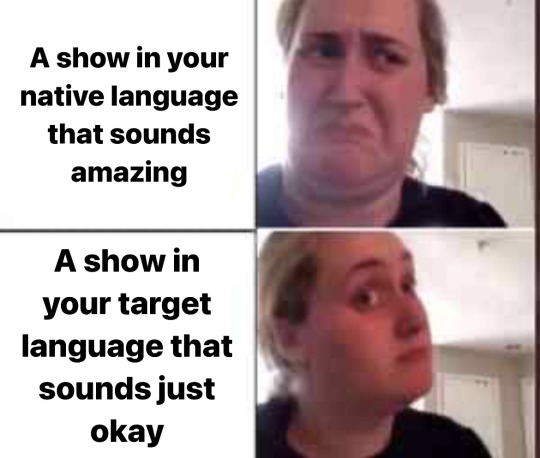
#memes#langblr#studyblr#benkyou posting#language learning#polyglot#langblr I love you but can we bring back the memes#I feel like I don’t see people just making silly posts about languages anymore
365 notes
·
View notes
Text
I would LOVE to hear from anyone who went through university studies in a language that isn't their native one! Share your experiences!
How did you manage ? What was the most difficult part ? What language learning level were you at before you started the course ? I am so curious about all of the details !!
#Feel free to respond to this post or send in an ask if this applies to you !#studyblr#studyspo#cottagecore#langblr#studying#study motivation#study blog#study aesthetic#study inspiration#studygram#student#university#romantic academia
510 notes
·
View notes
Text
Oh, I think I must terminate this blog soon.
Hear me out, the following reasons are my current reasons, all relating to Duolingo, not this blog:
The recent laying off of translators in favour of AI.
Poor quality lessons.
Reliance in meme status to keep face and relevancy.
Termination of critical courses to focus on the Big Five.
Inaccuracy in many lessons.
My hyperfixation is dying.
Numerous other reasons to leave to a higher quality learning app, not one that’s just a translator.
Please let me know your opinions on the situation.
#duolingo#duolingo appreciation post#actually not an appreciation post#langblr#I cannot leave the app as I have family on there who check my work#This is my 96th post#If I commit an Unnus Annus on this blog for the hundredth#how silly would that be?#/genuine
485 notes
·
View notes
Text
spanish resource lists for learners
a list of lists!! levels are estimated.
refold has a crowdsourced resource list for spanish, curated & with notes | A1 to C2
dreamingspanish on reddit has a crowdsourced spreadsheet with over 90 channels geared towards learners | A1 to C2
learn natively has a huge deck of spanish books sorted by difficulty by learners | A1 to C2
prensa escrita has a list of news websites sorted by country & sometimes city | B1 to C1 probably
the CI wiki has an editable list of CI resources and a couple of native content links | A1 to like B2?
comprehensible hub has tons of spanish podcasts for learners | A1 to B2
letterboxd has a ton of very fun #español lists, e.g. movies mentioned in the wild project podcast, latin american female directors, made in puerto rico | ~B2 to C2
there are also a ton of moocs in spanish for intermediate to advanced learners (moocs are online courses, usually free) | B1 to C2
#spanish langblr#spanish notes#*#langblr#language learning#spanish language#perhaps this is unsurprising after my last post#we're compiling babeyyyyy
348 notes
·
View notes
Text
Gàidhlig vs Gaeilge
The languages Scots Gaelic* (Gàidhlig) and Irish Gaelic (Gaeilge, also known in English as simply “Irish”) are two separate languages, yet in English they are often both called Gaelic.
However, they are pronounced completely differently.
Gaelic (Scottish) rhymes with Alec
Gaelic (Irish) sounds like Gay-lick
As a fun fact, it's easy to tell apart Scots Gaelic and Irish Gaelic visually because in Gàidhlig 🏴 all the accents are grave - “welcome to Scotland”, which you'll see driving over the border, is “fàilte gu Alba” - while in Gaeilge 🇮🇪 all the accents are acute - “welcome to Ireland” is “fáilte go hÉirinn”.
This has been a very friendly PSA from a Scot who has heard Scots Gaelic mispronounced as “Gaylick” too many times - and now you can go on your merry linguistic way confident in your pronunciation of these two words which look identical but sound totally different and refer to two separate things.
*not to be at all confused with the Scots language, which is its own separate thing and very much not included under “Gaelic”
#langblr#languages#learning languages#language learning#linguistics#gaelic#scots gaelic#gàidhlig#irish language#irish gaelic#gaeilge#my posts
286 notes
·
View notes
Text
love that there's no translate button on tumblr. don't know the language? you can't sit with us. keep scrolling slut.
#no translate button we die like men#tumblr#tumblr features#hellsite#translate#langblr#shitpost#meme#short post#tumblr appreciation#languages#language learning#mean girls
157 notes
·
View notes
Text
How long will the japanese wikipedia article for goncharov last?
And how big is the internet, really?
I was in a wikipedia hole recently and I happened to notice that the Japanese article for Goncharov is the only language variant that is completely in-character.

Every other language specifies it as “Goncharov (meme)”. Japanese lists it as “Goncharov (1973 film)”, and formats the introduction as if it were a real movie:

Goncharov is a 1973 mafia film set in Naples, Italy. Produced by Martin Scorsese, the main cast includes Robert De Niro, Al Pacino, John Cazale, Gene Hackman, Cybill Shepherd, and Harvey Keitel.
— Wikipedia (my translation)
The rest of the article does go on to acknowledge Tumblr’s influence in Goncharov’s popularity, but every mention of this influence frames it as reviving the popularity of the supposedly real film. On two occasions the word 再燃 is used (the first kanji means “again” and the second kanji means “burn” - it means “rekindle” and can be similarly used in the metaphorical and literal sense, just like the english word “rekindle”).

Goncharov became particularly popularity on social media as a result of a reblog of a Tumblr post in August 2020. The post depicted shows the title of the film (Goncharov) in place of a brand logo on a shoe, which were described as “knockoff boots”. The image post and the comment attached to the reblog, mocking the fact that the original poster had not seen the film, became an internet meme. In November 2022, a poster made by a fan of Goncharov was uploaded to the internet, and the film’s popularity resurged. Various fan-made content about the story and production began to spread on Tumblr and other platforms. Goncharov has been widely covered in the media as an example of how fandom is born on the internet, with many prominent figures, including Scorsese himself, leaving comments.
— Wikipedia (my translation)
It’s clear the article is trying to adapt the real history of the meme and incorporate it as much as possible into the fictional history of the film. The rest follows quite similarly, and includes more analysis of how Tumblr culture created the “reignited” popularity, how Elon’s acquisition of Twitter resulted in an exodus of users to Tumblr which may have contributed to the increased awareness of the “movie”, etc. Though most of it is directly translated from the english, enough of it is original (such as the attempts to reconcile both real and fictional histories) that I suspect the article’s current state is intentional.
To get back to my initial question, how long will this article last like this?
Remember the whole Scots Wikipedia debacle? An american teenager had basically used simple word replacement to translate over 23,000 articles into Scots. Some people noticed this, but not many, and not loudly enough. It was only after a well researched reddit post pointed out the scale of the damage that people really took notice and action was taken. The wikipedia editor had apparently been doing this for 7 years before the reddit post was made.
If 20,000 articles could go largely unnoticed for 7 years, I imagine a single article could easily evade similar detection. Realistically, how many Japanese speakers are going to even hear about Goncharov and make it to the wikipedia article? Then, how many of them are going to do more googling and find out it’s all a hoax (or know already)? THEN, how many of them are going to tell a wikipedia admin that the article is a lie, or publicise it somehow in a way that forces the editors to update the article?
I think the reality is that although the internet may appear to be a massive open town square (or several), it also has side streets, and side streets of side streets. I feel like the number of active members in each online hobby or interest group are really quite small, and then they get divided between platforms, and even further divided into subgroups. I think if one decided it was something one wanted to do, it would be quite easy to become one of the most prevalent members of any online community you chose just by devoting the time and energy to it.
It’s also kind of shocking how much internet content is inaccessible on account of it being in a different language. English reigns supreme in terms of sheer volume, but there is original research and journalism and entertainment and art in every language, that hasn’t and might never be translated into english. For example, I found it very difficult to find any english sources or research for my post about the evolving conjugation of 違う, but I easily found several japanese papers and websites. In fact, if you google “違くない adjective or verb”, the first english result that doesn’t just handwave it as “informal” or “slang” is a tumblr blog with my post on it!

It’s a small internet indeed where my little hobby language blog is, according to google, the prevailing english source on what is quite a remarkable change in Japanese grammar that’s been happening since the 80s.
I think the Japanese unreality version of the Goncharov wikipedia article will stand for many years to come.
(below link shows the article at time of writing)
#langblr#japanese#japanese language#language#goncharov#the internet#long post#essay#日本語#jimmy blogthong
327 notes
·
View notes
Text
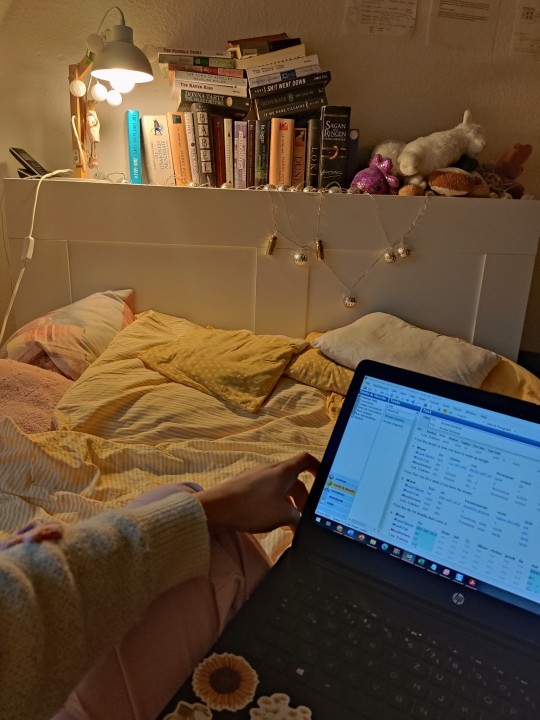
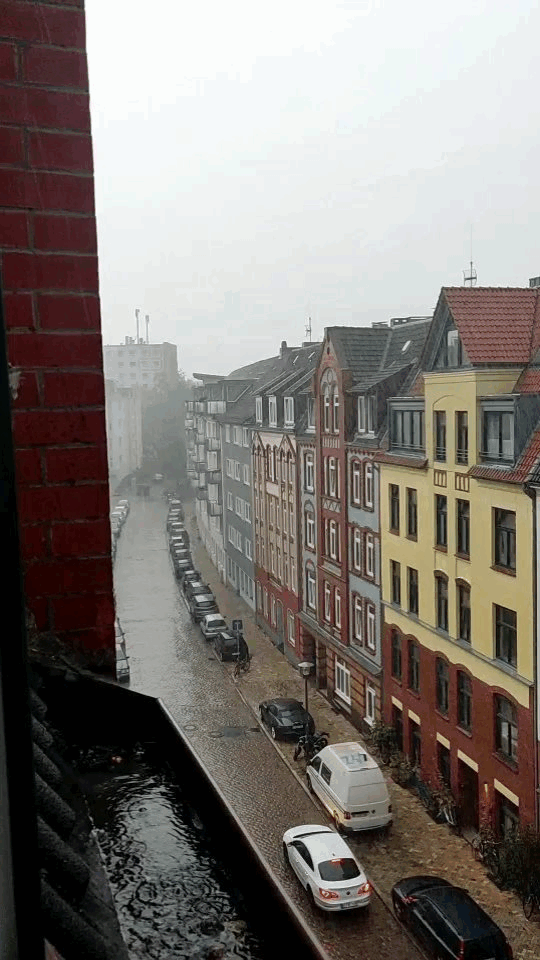
5.7.23 🌧️ rain and wind and assignments ♡
#very spontaneous post but i feel so cosy rn <33#studyblr#langblr#aesthetic#study aesthetic#study inspiration#studying english literature#studying linguistics#studyspo#academia#jaystudies
2K notes
·
View notes
Text
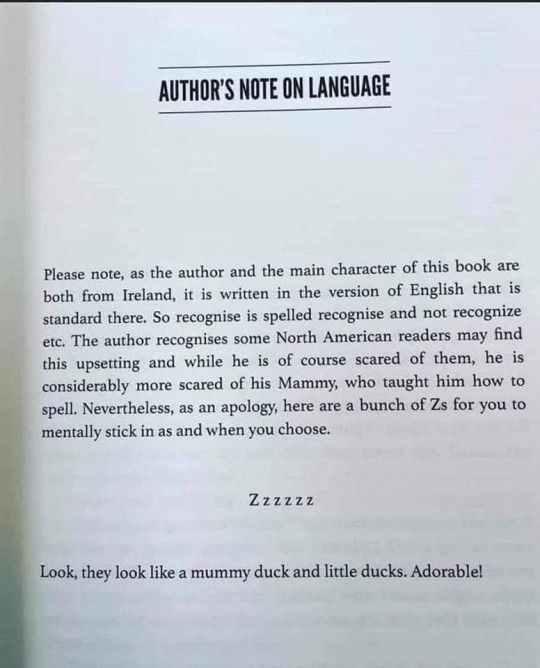
book: Disaster Inc by Caimh McDonnell
#literature#books#reading#bookblr#studyblr#dark academia#classic academia#light academia#academia#literature memes#languages#linguistics#language#polyglot#langblr#my posts
701 notes
·
View notes
Text
So if I’m speaking Spanish, and I need to say an English word — like a name, brand, website, etc — I say it like a Spanish speaker
However, I hear a lot of speakers drop into a very native English accent in the middle of a sentence to say “el Starbucks” and whatnot (I love hearing it. Just a random completely English-sounding word in a Spanish sentence)
So I’m wondering…
From my personal observations I think native bilinguals do this more, but I’m interested in more data. Feel free to reply or reblog for a more detailed answer!
(EDIT: sorry the poll is so confusing. “YES” means yes, you do the thing I described, changing your accent to a different one in the middle of a sentence)
#resisting the urge to ask people to reblog for more results but like#I want to know#I have heard that it’s easier to switch between languages when you’re more fluent so my hypothesis makes sense#Quinn polls#quinn posts#langblr#language#linguistics#linguistics study#poll
580 notes
·
View notes
Text
Just in case anyone needs to hear this - there was a time when I was REALLY bad at Spanish... I wanted to be good at it, but I wasn't
I have a core memory of me of sitting on my bed surrounded by flashcards and just crying out of frustration because I really did want to learn Spanish and be able to understand it, but I was not there
Whenever I got something wrong or messed something up or couldn't remember a word or just plain didn't know the answer to something I felt like such a failure and that all the work I was doing wasn't getting me anywhere
I think a part of me wanted to be really good at Spanish and if I wasn't perfect then I wasn't good, if that makes sense... and there were times when I wanted to give up but I also knew I couldn't or wouldn't give up
I don't know if this is determination on my part or stubbornness but as much as I despaired thinking I was never going to know Spanish, I also felt in me that I could not walk away from it, at least not for good
I don't know when the despair started to fade away... I think it was when I was starting to tutor people at school, or when I was understanding the grammar more - at least things I had already learned
Some of it was just the memorization of tenses and conjugations where it wasn't a struggle in every way at every moment
And then I started to get to the point where I was good enough to read things, and I could look up answers on my own with a dictionary and I could find other people discussing the grammar I had struggled with, or trying to find context I didn't have for some phrases I was seeing
I got to a point where I was more comfortable, but still didn't know as much as I wanted... all I knew was that people were struggling with things I already knew, which meant that I had learned it, and that I knew what I didn't know so that helped immensely because it made me feel like I had something to gauge my progress
So again if you see me and think "wow they know so much I'll never get there", don't compare yourself to me - I've been studying for close to two decades now and I still don't know everything about everything
Grammar I know because I took lots of classes and read A LOT, and not just books I mean I was reading grammar sites and dictionaries to try and figure out things like "what's that se mean?" or "why is this word feminine if it has the masculine article?" or "why are these two conjugations different but okay to use?"
It feels like it takes forever to get there, but learning Spanish to the degree that I have feels like a real achievement for me - it's not something I lucked into or got right on the first try, it's something I earned myself for myself
It's going to take time but if you put in the effort and if you really want it, you can get there too
237 notes
·
View notes